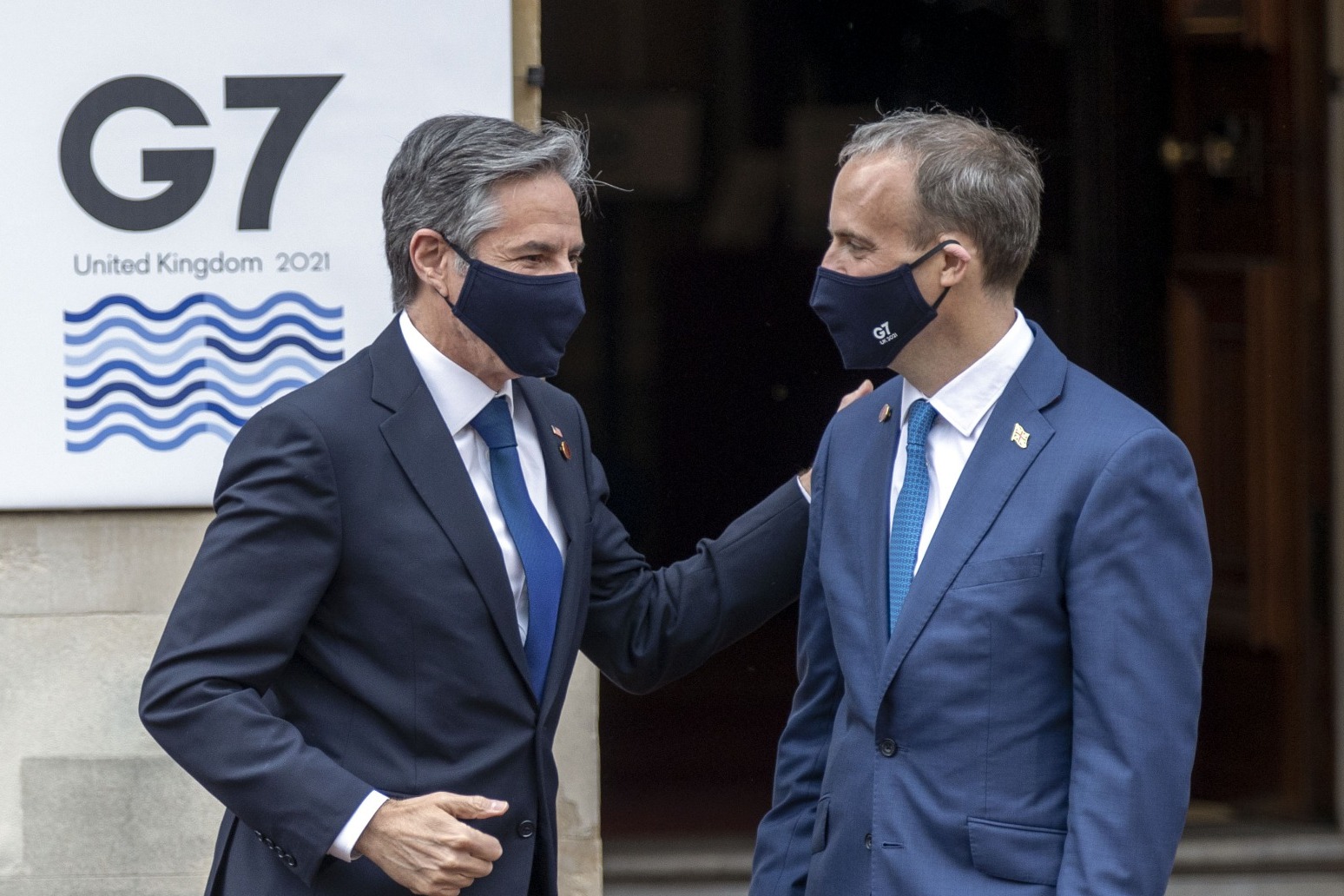
G7 foreign ministers meet amid strict coronavirus controls
Foreign ministers from the UK, US and other leading nations have met for the first time in more than two years amid tight coronavirus restrictions.
Foreign ministers from the UK, US and other leading nations have met for the first time in more than two years amid tight coronavirus restrictions.
Dominic Raab welcomed his counterparts to Lancaster House for the G7 meeting, the first opportunity for representatives of the group of industrialised nations to meet face-to-face since the pandemic hit.
The Foreign Secretary and the other ministers were separated from each other by clear screens at the summit table, while the number of aides present in meetings was also limited.
The Foreign Secretary, wearing a face mask, welcomed his counterparts from France, Germany, Italy, Japan, Canada, the US and EU, with awkward forearm bumps replacing the usual handshakes.
Along with the problems of coronavirus, the blustery weather also posed difficulties, with the red carpet rolled out for the visiting dignitaries initially refusing to stay in place in the gusts whipping across the courtyard – judicious use of gaffer tape helped avoid a diplomatic incident.
Regular testing and cleaning regimes are in place at the summit – with one insider joking that there is “hand sanitiser running down the walls” – with the UK keen to avoid any coronavirus issues as it begins hosting a series of international meetings aimed at securing its place on the global stage following Brexit.
The meeting of foreign ministers will be followed by a full summit in June – the first overseas visit by US President Joe Biden.
The UK is also battling to make sure the Cop26 climate summit in Glasgow in November will be a physical event rather than a virtual one.
At the foreign ministers’ meeting on Tuesday, Mr Raab was expected to lead discussions on relations with Russia, China and Iran on Tuesday, as well as the crisis in Myanmar, violence in Ethiopia and Syria.
It comes after Mr Raab held talks with US secretary of state Antony Blinken in London on Monday, with discussions set to continue with Prime Minister Boris Johnson on Tuesday.
As the two countries forge a fresh relationship following the departure of Donald Trump from the White House, Mr Blinken said the US has “no closer ally, no closer partner” than the UK.
The G7 discussions are set to cover the coup in Myanmar, when Mr Raab will urge his counterparts to take stronger action against the military junta, before turning to the situation in Libya and the ongoing war in Syria.
Mr Raab will use Tuesday evening’s working dinner to outline a vision of cooperation between the G7 and Indo-Pacific nations to develop stronger trade ties, ensure stability and tackle climate change, according to the Foreign Office (FCDO).
Australia, India, Japan, South Korea and South Africa have been invited as guests as the UK tries to deepen ties with the Indo-Pacific region.
Ahead of the talks, he said: “The UK’s presidency of the G7 is an opportunity to bring together open, democratic societies and demonstrate unity at a time when it is much needed to tackle shared challenges and rising threats.
“The addition of our friends from Australia, India, the Republic of Korea and South Africa, as well as the chair of Asean reflects the growing significance of the Indo Pacific region for the G7.”
G7 ministers will invest 15 billion US dollars (£10.9 billion) in development finance over the next two years to help women in developing countries access jobs, build resilient businesses and recover from the impacts of Covid-19.
They are also expected to sign up to new targets to get 40 million more girls into school, and 20 million more girls reading by the age of 10 in poorer nations by 2026, the FCDO said.
But the commitments come as Mr Raab faces sustained criticism for cuts to foreign aid, from 0.7% of national income to 0.5%, citing the financial impact of the pandemic.
The Foreign Secretary told the joint UK-US press conference on Monday that aid cuts had been a “difficult decision” but that the UK still has scope “to be an even greater force for good in the world”.
Published: by Radio NewsHub